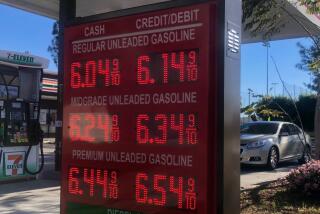The magic number
- Share via
If we can read Wednesday’s market news as a sign, 2008 could be a challenging year for the economy. In the new year’s first hours of trading, the price of oil hit a record $100 a barrel on the New York Mercantile Exchange.
Number-crunchers on Wall Street have an- ticipated this psychological milestone for some time. Oil prices have been rising since 2004, jumping almost 60% in 2007 to hit a then-record of $99.29 on Nov. 21. News of violence in Nigeria and supply hiccups in Mexico and the OPEC countries nudged prices into record territory again on Wednesday. Adjusting for inflation, oil is now about as expensive as it was in the dark days of 1980. “At $100 a barrel, we can start calling this an oil shock,” one economist said.
Perhaps. But it doesn’t necessarily portend a return to Carter-era doldrums. So far, the effects of high oil prices have been surprisingly modest. Yes, prices at the pump have gone up -- for regular, from about $2.20 a gallon to about $3 last year alone, with $3.50 or $4 looking increasingly possible. Americans are beginning to change their fuel consumption habits, choosing to leave their gas-guzzling SUVs in the garage in favor of smaller cars (though perhaps not as quickly as the environmentalists among us would like).
But rising oil prices haven’t upended the economy as a whole. Inflation remains relatively low, and many economists believe that the country can still avert a recession. They cite a number of reasons for this resilience. American companies are more efficient than they were 25 years ago, requiring less energy to produce goods and services. American families spend less on fuel too. In 1981, U.S. households spent more than 6% of disposable income on gasoline; today, they spend about 4%. The Federal Reserve has had an effect as well, by bolstering businesses’ belief that inflation is in check. Companies, confident that the price of oil will eventually come down, pass fewer fuel-cost increases along to consumers. Consumers, in turn, continue spending, keeping the economy growing.
Of course, the steady rise in the price of oil hasn’t been painless for everyone. For many lower- and middle-wage earners, it creates immediate hardship in the form of higher heating and transportation bills. For all of us, it portends a future of continued volatility and uncertainty. If oil prices remain around $100, experts say, the economy will eventually slow. We must reduce our dependence on this limited resource.
More to Read
Inside the business of entertainment
The Wide Shot brings you news, analysis and insights on everything from streaming wars to production — and what it all means for the future.
You may occasionally receive promotional content from the Los Angeles Times.









